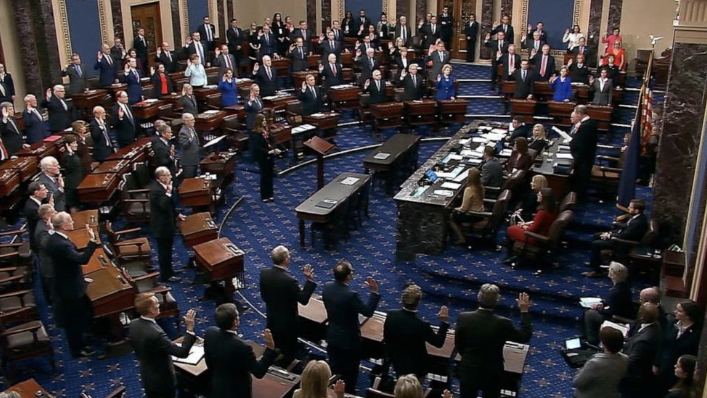Ukraine, Public Disdain, and A Presidential Campaign: A Look Into Trump’s Impeachment Trial
February 1, 2020
On January 16, the impeachment trial for President Trump began and has continued up to the point of this article being published. Trump was officially impeached in December on charges of abusing presidential power and obstructing Congress. The House of Representatives charged him with these crimes in light of an illegal interaction Trump had with Ukraine’s President, Volodymyr Zelensky. This interaction involved President Trump withholding 400 million dollars of military aid from Ukraine in until President Zelensky investigated Joe Biden’s son’s involvement in a potentially fraudulent Ukrainian business. This use of money to obtain a service, or quid pro quo, is perfectly legal for citizens, but is illegal for the President without the consent of Congress. This entire issue was brought forward by an anonymous whistleblower, who revealed what happened in August of 2019. Officials confirmed that this interaction between the Presidents occurred using White House phone recordings.
The first day of the trial mainly consisted of the Senators debating the rules of the trial. They decided that each side would have a total of 24 hours over three days to present their opening statements. The Chief Justice of the Supreme Court also allowed one of Vice President Mike Pence’s aides to testify on the record. On the second day of the trial, the prosecution presented its opening statement. They discussed what Trump directed his aides to do and what the aides actually did. They also described what other officials thought about Trump’s actions and how John F. Kennedy and Alexander Hamilton would have opposed Trump. On the third day of the trial, the prosecution continued their opening statement by showing videos of lawyers who said that Trump’s actions were illegal. Then, they used Trump’s own words to prove that Trump’s attempted investigation into the Bidens was politically motivated. The prosecutors are claiming that Trump was trying to ruin Joe Biden’s chances of winning the Democratic nomination for President.
Since the impeachment, Republican senators have demanded to know the identity of the whistleblower. So far, however, their attempts have been unsuccessful. In the meantime, Republican senators have also been trying to prevent eyewitnesses from testifying at the trial. Senate Minority Leader Chuck Shumer said that it was likely that the Republicans would successfully block the witnesses from testifying. The witnesses and other experts who have been able to testify were all open to questioning by the Senators.
The trial has been occurring for over two weeks with no end in sight. In order for Trump to be convicted, at least 20 Republican Senators will have to declare Trump guilty, along with every Democratic senator. This is extremely unlikely, but in the event that it does happen, senators would have to vote again on whether or not Trump would be allowed to run for President again later this year. Until then, Trump is free to continue on the campaign trail for re-election in 2020.

